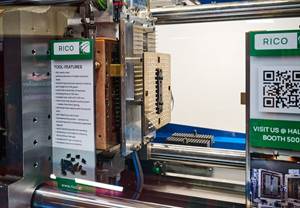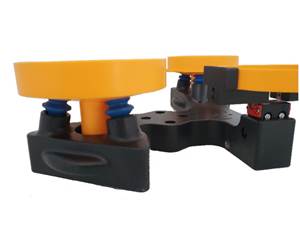NPE Diary Vol. 3: Industry 4.0 and the End of Waste
So much of what's on display at NPE2018 doesn't seem to be about producing more; it's about wasting less.
Yesterday I mentioned that I only listened to a presentation about Industry 4.0 because after about three minutes, my brain exploded. Today I set out to double, maybe even triple, the amount of time I could hear about Industry 4.0 before it inevitably surpassed my understanding.
When I think of Industry 4.0 (which, admittedly, is not very often, but anyway) I think of dongles and indicators on pieces of machinery. Little wifi-enabled nano bugs that transmit data about a piece or part back to one centralized location where that info can be compiled, analyzed and understood so that people can make better production decisions. Robots working in concert with humans. The fourth industrial revolution, and so on and so forth.
What I don’t think of is waste. But today, as I meandered around the South Hall I began to realize that’s pretty much all Industry 4.0 is about—ending waste, or turning something that might’ve become waste, and making it an asset.
I’m not necessarily talking about material waste. I’m thinking more about wastes of time or wastes of energy or wastes of brainpower. In the BASF booth in the South Hall I saw a robot sort of…waving to me. I came over to say hello and met a friend of mine who was working in the booth (note: no, she is not a robot).
In the BASF booth there’s a sign about Industry 4.0 and I was sort of surprised because I didn’t see how materials figured into what, until today, had seemed to me to be a much more machinery, IT-related development. My friend was kind enough to enlighten me to the fact that all those robots and indicators—all the things that report back to that centralized system I mentioned earlier—have to be made of something. It has to be durable and it has to be lightweight and companies like BASF enable those things to happen.
BASF didn’t manufacture the robot in their booth (the one that was waving), as my friend told me, but they made it better. Because of BASF’s materials, it’s lighter so it wastes less energy, and it doesn’t break or malfunction as often so it wastes less time. A lot of Industry 4.0 robots can make some small decisions themselves, so they don’t waste valuable human brainpower making minor choices. And so on and so forth.
After I left the BASF booth, elsewhere in the South Hall I watched a guy grab a box of collected scrap plastic material that had been discarded by the injection molding machine pumping out orange plastic bottles in his booth. He took the box full of scrap material away so it could be reprocessed and then put to good use later.
Swap out “scrap plastic material” with scrap time, scrap energy and scrap human brainpower, and this guy was doing the work of Industry 4.0 right there in his booth. From those seemingly tiny, simply tasks happening every day on the floor to the loftiest, most advanced technologies, the goal of everyone here seems to be working toward is the end of waste—every kind of it.
Anyway, more adventures to come tomorrow!
~J.
Related Content
LSR Advances in Dispensing, Tooling and Automation
At Fakuma 2023, Sumitomo (SHI) Demag’s LSR injection molding machines showcased advances from itself and partners Reinhardt-Technik, Rico and Sepro.
Read MoreEnsuring Repeatability: The Key to Effective Injection Molding Automation
One of automation’s key promises is repeatability: the same movement to the same location, time and time again. But to achieve that, all elements involved — robot, machine, EOAT, mold — must be in and stay in alignment.
Read MoreEngel Teases Generative AI Assistant at Digital Days Event
The Austrian maker of injection molding machines and automation introduced a prototype large-language model assistant for its customers: Engel GPT.
Read MoreHow This Custom Compounder Leverages AI to Drive Innovation, Sustainability
Alterra has stepped up its cutting-edge Industry 4.0 technology with its own AI platform to further increase its efficiencies.
Read MoreRead Next
People 4.0 – How to Get Buy-In from Your Staff for Industry 4.0 Systems
Implementing a production monitoring system as the foundation of a ‘smart factory’ is about integrating people with new technology as much as it is about integrating machines and computers. Here are tips from a company that has gone through the process.
Read MoreSee Recyclers Close the Loop on Trade Show Production Scrap at NPE2024
A collaboration between show organizer PLASTICS, recycler CPR and size reduction experts WEIMA and Conair recovered and recycled all production scrap at NPE2024.
Read More









